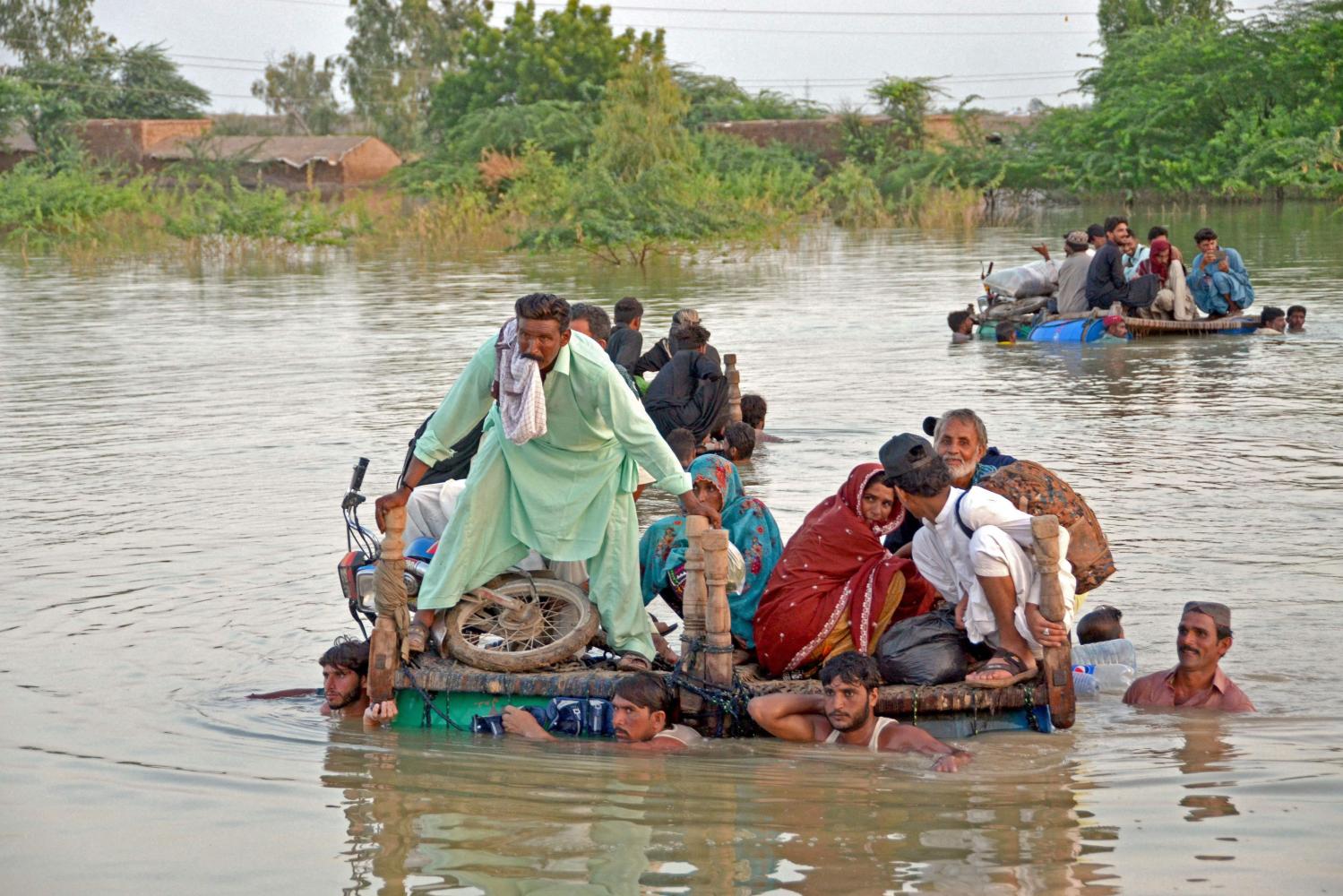
'I have never seen climate carnage on the scale of the floods here in Pakistan. As our planet continues to warm, all countries will increasingly suffer losses and damage from climate beyond their capacity to adapt. This is a global crisis, it demands a global response," wrote UN Secretary General Antonio Guterres on Twitter on Monday, at the end of his two-day solidarity trip to the flood-affected areas of Pakistan.
This tweet encompasses the situation well. Mr Guterres is expected to help Pakistan by highlighting the devastating impact of the recent floods. Yet the agony of the 33 million people suffering from the fallout of the catastrophic floods, which have caused an estimated US$30 billion worth of damage, cannot be explained easily in words.
Right now, one third of Pakistan is flooded. Over 1,500 related deaths have been confirmed as of late last week and the count has far from ended. More than half a million more houses in Pakistan were reportedly damaged, if not completely decimated, in the past week alone. The National Disaster Management Authority (NDMA) reported over 1.17 million damaged houses and nearly 566,000 destroyed houses as of Sept 8. Nearly 6,700 kilometres of roads have been damaged or destroyed, with over 1,600km affected in the first week of September alone. In addition to stopping people fleeing to safety or towards essential services, this has also complicated efforts to deliver aid to affected areas -- as has the destruction of at least 246 bridges.
These unusual and unprecedented floods are a corollary of changing climate patterns due to greenhouse gas emissions generated by rich industrialised countries. Against this backdrop, a sense of gross injustice is being felt far and wide across the country. Pakistan contributes less than 1% of global greenhouse gases that are raising the temperature of our planet, but its geography makes it extremely vulnerable to climate change. Mr Guterres stated there is "no memory of anything similar to what has happened with the impact of climate change in Pakistan".
The country's location renders it vulnerable to two major weather systems: one that can increase temperatures and trigger drought, like the heatwave in March, and the other that instigates monsoon rains. Most of the population live along the Indus River, which swells due to monsoon rains and causes floods.
Pakistan has something else that makes it susceptible to climate change -- its immense glaciers. With 7,253 known glaciers, including the highest outside the polar region, it has more glacial ice than anywhere on Earth -- except for polar regions. That's why it is sometimes called the "third pole". Those glaciers feed rivers that account for about 75% of the stored-water supply in the country. But global warming has intensified the melting process of these glaciers, which has further aggravated the worst floods in Pakistan this century.
The catastrophe probably started with the phenomenal heatwaves witnessed in April and May, when temperatures climbed above 40C for prolonged periods in many places. In May, the city of Jacobabad saw the mercury hit 51C, making it the hottest place on the planet.
These unusual features were then exacerbated by the early arrival of the monsoon on June 30, which was generally wetter over a larger region for a prolonged period of time. As a result, Pakistan has received almost three times its average annual rainfall during the monsoon period, adding more fury to the floods. That said, Pakistan is suffering due to no fault of its own. Global warming is the main culprit bringing devastation to the country. The real challenge for Pakistan, as well as the international community, is how to deal with this massive devastation and the looming humanitarian crisis.
Pakistan and the United Nations have joined hands to launch the "2022 Pakistan Floods Response Plan" with an appeal for immediate $160 million for flood-hit people to provide them with relief and rehabilitation at the earliest possible date. However, this still falls far short of the mark compared to the estimated damages of $30 billion.
The restructuring and rehabilitation of one third of Pakistan requires massive and generous support from the international community, which is still missing. Yes, some countries have started sending relief goods, but the amount is too small to create any serious impact, as this is minuscule in relation to the scale of the damage. According to rough estimates, 65% of Pakistan's main food crops -- including 70% of its rice -- have been swept away and 3 million livestock have perished during the floods, triggering alarms about an impending food crisis. The volume of international support is very disappointing.
There is a need for a holistic plan with a multi-sectoral approach covering the thematic clusters of food security, agriculture, health, education, nutrition, shelter, sanitation and hygiene. Of course, Pakistan is a resilient nation, but it needs reassurance from the international community and assistance to recuperate from this disaster quickly. We have waged a war on nature and nature is striking back in a devastating way. Today it is Pakistan. Tomorrow it could be any country.
Dr Imran Khalid is a freelance contributor based in Karachi, Pakistan. He qualified as a physician from Dow Medical University in Karachi in 1991, and has a master's degree in international relations from Karachi University.







